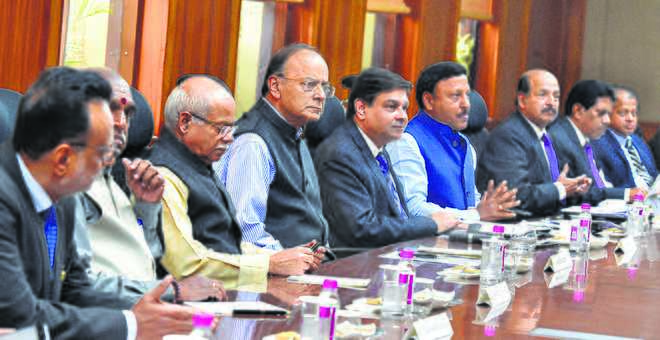
ADDS UP: The FM has held the RBI responsible for the bad loans on banks’ books.
Subir Roy
Senior Economic Analyst
THE recent board meeting of the RBI was widely welcomed for lowering the acrimonious pitch that had marked the government-RBI dispute leading up to it. The meeting critically laid down a roadmap for arriving at agreed solutions. However, what has followed does not seem to be in the same spirit of jointly thinking through new structures.
Within a day of the meeting, a news item, quoting unnamed government sources, claimed that the meeting was a small victory for the government. Thereafter, Finance Minister Arun Jaitley claimed that the government had enough resources to tide over the next six months and it was not eyeing RBI’s reserves for fiscal support. This immediately raises the question: why the key decision to jointly set up a committee to find an acceptable way of arriving at what can be an adequate level of reserves for the RBI?
More recently, a senior official has posed the question: how can banks return to health if they do not lend? The logic is that it is successful lending that yields a surplus, without which banks have to pay depositors out of their own pockets. The obvious answer to this is that the first step needed for banks to return to good health is for their owner, the government, to recapitalise them so that, at the minimum, they have a respectable capital adequacy ratio. Recapitalisation requirements are a kind of moving target as fresh NPAs get created and need to be addressed. Around a fifth of the recapitalisation planned for the current financial year is yet to happen.
During all this time, media stories originating from the RBI have been conspicuous by their absence. The Union Finance Ministry is among the best covered and correspondents need stories. When sources are willing to talk that makes two who can tango. The RBI, on the other hand, has a conservative culture and is averse to using the media creatively.
That is why we have had to wait over a week to get the RBI’s side of the story, so to speak, through what Governor Urjit Patel had to tell the Parliamentary Standing Committee on Finance. And, as is to be expected, he gave away little that would have pleased dramatic headline writers. Expectedly, he asserted the need for RBI autonomy to protect the interests of depositors (remember the proposal for haircuts for depositors too?) and the economy’s global credibility. But on several key issues, he has agreed to come back to the committee soon with written answers! The cultural difference between the two organisations is palpable.
The differences, in fact, go deeper and centre around perceptions of current economic realities. The Finance Minister has said ‘if some sectors are starved of liquidity or credit, then we will flag those issues’. The Governor, on the other hand, told parliamentarians that the outlook for the economy was optimistic, credit growth was running at 15 per cent, the easing of oil prices would give it a boost and the impact of demonetisation on the economy had been transient.
If both think the economy has been doing well — Jaitley will be the first to proclaim that it has done splendidly under NDA rule — what is the fuss all about? Jaitley is possibly arguing that the economy is doing well despite small businesses being starved of credit. So the government wants central bank restrictions on commercial banks in trouble, at least so far as lending to the non-corporate sector is concerned, to be eased.
It is on this that the RBI is very reluctant. Banks cannot loosen their purse strings, not even for small businesses, so long as they remain unhealthy. And the recovery rates for loans given to this sector, even in the best of times, is relatively poorer.
Jaitley has held the RBI responsible for the mountain of bad loans on banks’ books today. It looked the other way when banks lent indiscriminately during 2008-14 to keep the economy running ‘artificially’. Fascinatingly, Raghuram Rajan is in wide agreement with this. What the RBI ought to do better, he had indicated in his submission to the parliamentary committee, is raise red flags earlier, even as it sees exuberance taking hold of bank lending and show less of forbearance in the hope that things will get better with economic recovery.
The banks’ asset quality review, which began during 2015 at his behest, has culminated in ‘prompt corrective action’ which lies at the root of banks’ inability to lend. Surely, Jaitley is not telling the RBI: you let banks under UPA II lend indiscriminately, now you must let banks loosen up till next year!
Overall, it seems that what the government wants the RBI to do, but cannot say so explicitly, is offer some kind of accommodation, so that maintaining fiscal discipline does not become a challenge. It also wants banks to loosen their purse strings, which they cannot do so long as they are under the current firm RBI discipline, so that the feel good factor increases in the runup to the elections next year. But the RBI, having erred once, does not want to do it again.
When the government found that the RBI wasn’t buying, it threw the rule book at the central bank, pointing out Article 7 of the RBI Act to emphasise who the boss was. But when the RBI still hit back (vide Viral Acharya), there was a board meeting full of sweet reasonableness and plans to find structured solutions. And while these things were being worked out, what is the harm if a few sources keep saying, we won, we won!



























